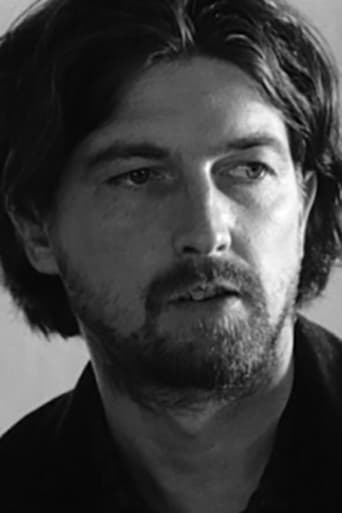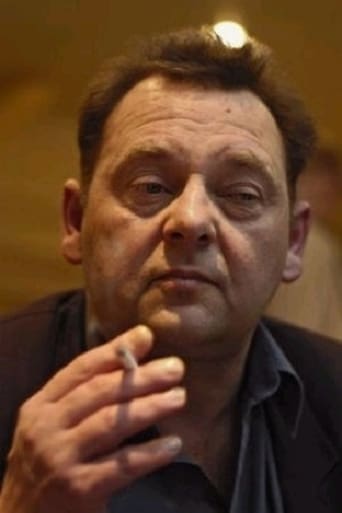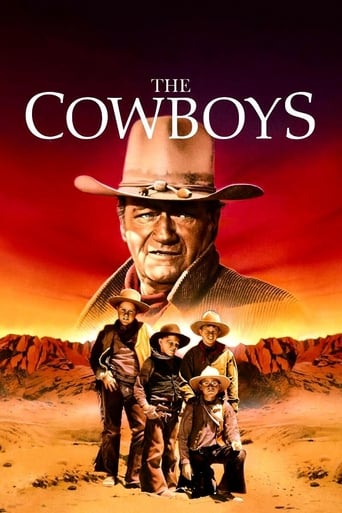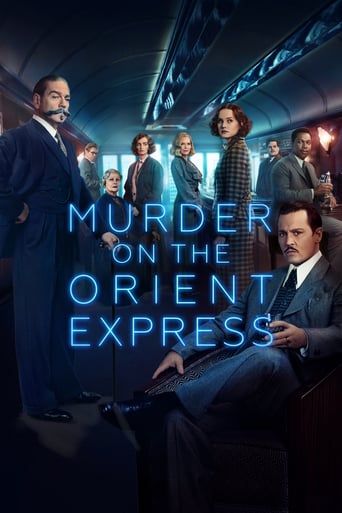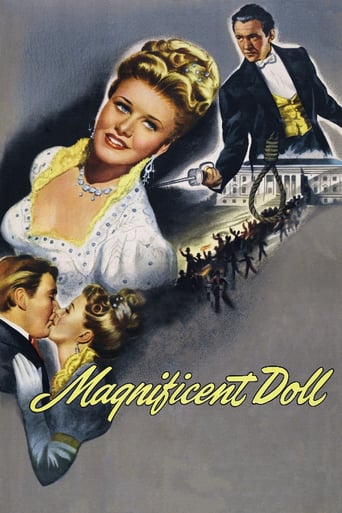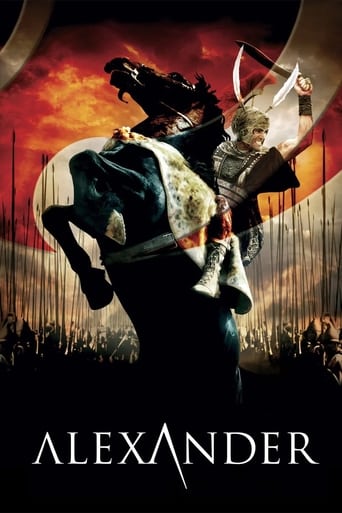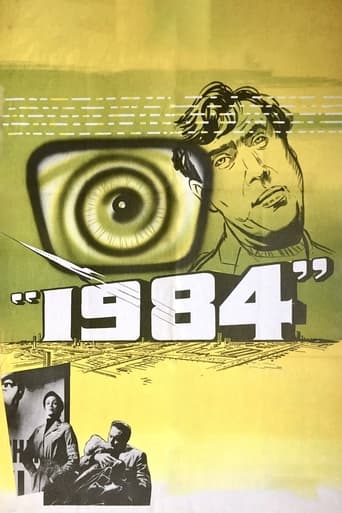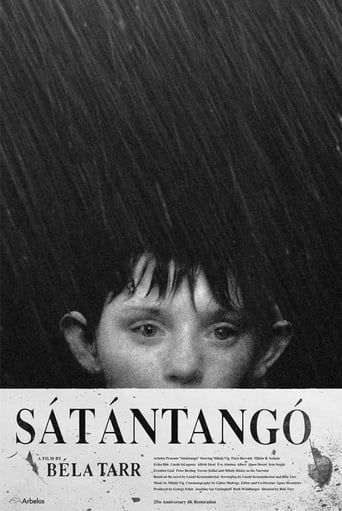
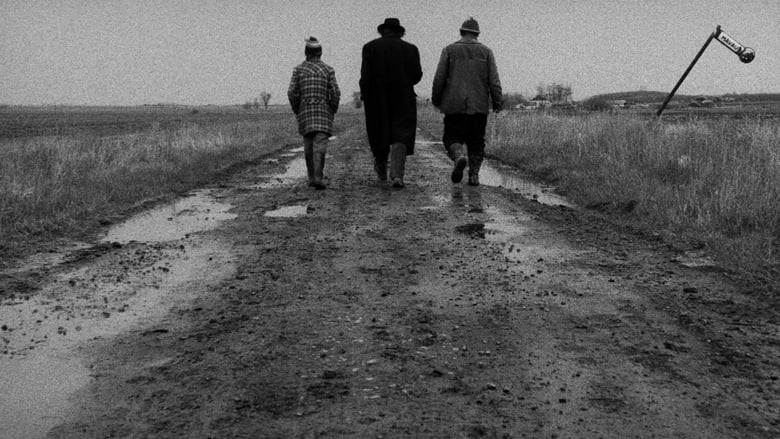
Satantango (1994)
Inhabitants of a small village in Hungary deal with the effects of the fall of Communism. The town's source of revenue, a factory, has closed, and the locals, who include a doctor and three couples, await a cash payment offered in the wake of the shuttering. Irimias, a villager thought to be dead, returns and, unbeknownst to the locals, is a police informant. In a scheme, he persuades the villagers to form a commune with him.
Watch Trailer
Cast
Similar titles
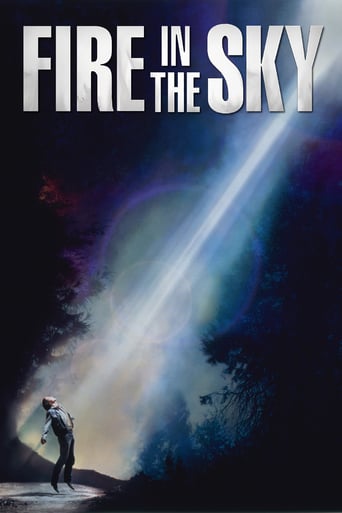
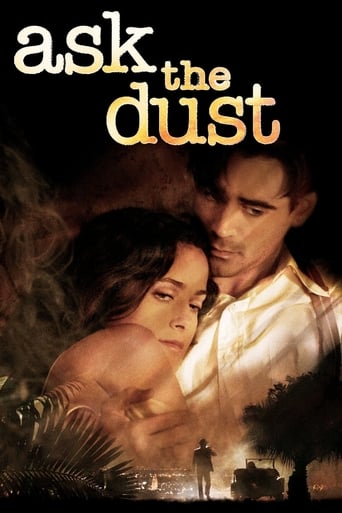
Reviews
Simply Perfect
Good movie but grossly overrated
Fresh and Exciting
A Masterpiece!
"Cowardice, sinful Impotence" -- Irimiás, an outsider.As the movie opens, a Herd of Cattle is seen wandering aimlessly in the Village. These animals differ not much from the Villagers they symbolize and share the rural air with. The humans here, are living (or rather dying) a life of Hopelessness, Aimlessness and Despair with nowhere else to go and nothing else to do.As if to augment villagers' own Woes, there's Mother Nature, hell-bent on grinding, beating the Villagers down with a Catastrophe of it's own: Heavy Torrential Rains that do succeed in hiding the tears of the Villagers, but also succeed in destroying everything that the Villagers have a scarce sense of ownership of, ...including the thin Coats on their stagnant bodies, which perhaps are their Last Resort of Protection.To stave off a certain Madness looming over them and thus to ascertain Psychological Survival, each villager has an elusive escape-route of his/her own: extra-marital affairs, brandy, note-taking, holy books...anything goes by. It's a tragic affair, because not even small children are exempted from this shadow of Pessimism and their Neurotic Behavior is always simmering on the surface. The degree of Despair in the Villagers can be gauged from the fact that they trigger into some kind of blurry action only after a particular Tragedy strikes them and that's because each villager is a Reactive individual, not willing to find solutions himself/herself, but waiting passively and infinitely for some external miracle to show them the way.Each villager has a Personal Story of his own...and a varying Degree of Madness. The Doctor is mad, the Repent inside him not being sufficient enough to offset his Addictions. Kelemen is crazier than the Doctor. But Kelemen, still, may not be as mad as the Madman who tolls the bells of the dilapidated church the whole day, but he is surely on his way there.Thankfully, Irimiás who arrives from outside the village as per the orders of the Law to help the Villagers, is looking for a Redemption from a personal past of his own. If not for the above quoted stinging words that Irimiás describes the villagers with, until their hearts burn, probably they might still have been lying around snoring, exactly like the Doctor believes them to be. But Irimiás has a plan...not a definite one...but nevertheless he has something that he has brought with himself that the villagers don't have: A Sense of Authority, Leadership Qualities ...and a Glimmer of Hope.Can he save the Villagers from their own Pessimism? ...Or will the Heavy Rains succeed in grinding the Villagers down?---- Sátántangó (1994), a Hungarian Drama from the acclaimed director, Bela Tarr.In a way, this movie is strangely ironic in that, we realize that the level of Despair in the atmosphere is at its deepest...but we also know that it cannot get deeper than this and now the only way out, is the way of Rising high up.The background scores by Mihály Víg, play a very important character in themselves and provide a distinct personality to each scene.The technique that makes this movie unique, is that we are witnessing the same Segment of Time from different Point of Views of various characters involved. Each View, arrives at a common point of a specific Revelation that has an immediate impact and then moves onward to that specific character's Individual Arc that again climaxes with a concrete Event.
No film is a 'masterpiece' if it involved physically torturing an obviously distressed cat for 10 minutes,throwing it around like an object, before wrapping it in a net bag and hanging up, then returning with a saucer of milk which is 'supposed' to have rat poison in it, physically forcing it to drink by pressing it's head down then - in the very same shot - standing by while the cat succumbs to unconsciousness, only for the character to be seen walking around with the corpse of the same cat in the next shot.And - get this - this is not just animal cruelty. A child actor of approximately 12-13 years old performs all these acts for the camera. Christ knows what mental effect it had on her.If this film had been made by a western director, critics would be excoriating it and its director. The only thing this 'masterpiece' reveals is that hypocrisy.
This is a 7 hour long film, whose long takes slowly start to creep under your skin and ultimately leaves you enchanted. In an almost abandoned village, the remaining villagers plot and scheme to get away with the money, but are all conned out of it by the false prophet Irimias. The story might appear to be about the end of communism or the exploitations of capitalism, but this is not the case. At the heart of this story lies the plight of a traumatized child (Estike) and an old recluse (Doctor). They are the true victims of a monstrous scheme which deprived them not of their money, but of their hope for a full, rich and human life and ultimately of their lives as such. What they were confronted with was a picture of a society in which cold, heartless human beings destroyed their own lives and those of others through their low-life plodding, drinking, fornicating - in short - through their unrelenting, drunken dance of Satan. It was this picture that killed them.What is perhaps most striking is the relation between this film and Tarkvosky's work. I think that, although this remains highly speculative, Tarr has taken up Tarkovsky's work as the thesis of a Hegelian dialectical triad. The thesis is the subjective, poetic and intimate splendor of a girl, Estike, sitting perfectly still with a purring a cat on her lap, a scene which lasts for minutes! So far Tarr's images are the offspring of Tarkovsky's work, although Tarr's long takes seem to capture the core of someone's existence with concrete textures in an almost sculpture-like way, whereas Tarkovsky's images seem to revolve entirely around their poetic nature. The antithesis however is the introduction of an ethical dimension: we learn that Estike is not only a deep girl who has an openness towards the sublime, but is actually a traumatized child with very very deep psychological problems, because we actually see her torturing and killing her cat and finally killing herself. Thus the poetic image is suddenly interrupted by an objective antithesis, although this ethical moment is also revealed as something which was always already present in the existential renderings of the film's characters: this is perhaps Tarr's critique of Tarkovsky! This ethical moment ultimately solidifies itself as a social and political moment, in that society's nihilism is identified as the cause of Estike's tragedy. However, the ethical, the social and the political are ultimately dismissed as one-sided, because the conduct of Irimias and the total abandonment of Doctor shows us that the ethical fate of society and the individual human being, cannot ultimately be determined by political means alone, but also demands a more radical transformation of man, perhaps an openness towards the sublime, which yields a synthesis between, the poetical, the intimate and the sublime with the ethical the social and the political. What is thoroughly un-Hegelian however, is the way in which Tarr ultimately sketches a very bleak picture of society, in which this synthesis is far from realized, and gives us nothing in the way of assurances that it is in fact realizable: on the contrary, it shows us only the dance of Satan.
I am giving this film high points, not as some have suggested because I want to be in with the in crowd but because I really enjoyed it and even after a month of seeing it I am still thinking of the significance of various parts.In my view, the reason the film is so long is because Bela Tarr wanted the viewer to be the characters, to feel what it is like to live their lives, squalor and all and not simply be a voyeur to the unfolding of the storyline as in other conventional films. The reason I don't in this case have a problem to give spoilers is that the Police Captain's speech when Irimias and Petrina are summoned before him is the heart of the matter for most of what follows. It is listed above in the Memorable Quotes section but so you don't have to go looking for it I will C&P it here."Captain: Not that human life was so highly valued. Keeping order appears to be the business of the authorities, but in fact it's the business of all. Order. Freedom, however, has nothing human. It's something divine, something... our lives are too short for us to know properly. If you're looking for a link, think of Pericles, order and freedom are linked by passion. We have to believe in both, we suffer from both. Both from order and freedom. But human life is meaningful, rich, beautiful and filthy. It links everything. It mistreats freedom only... wasting it, as if it was junk. People don't like freedom, they are afraid of it. The strange thing is there is nothing to fear about freedom... order, on the other hand, can often be frightening." This is so profound that most of the important themes in the film flow from this short speech. Probably the most important one is the observation (paraphrased) that people like the concept of freedom but they don't actually like to be free. It is usual to hear that people who, to one degree or another, live under oppression want to throw off the yoke of whatever system it happens to be but when they actually have their freedom they don't know what to do with it. In the film there is much talk about clearing off with the money from the sale of the farm, either fairly or unfairly divided and living lives of their own making. What follows is that Irimias appoints himself as the group's leader and everybody falls in line thus voluntarily placing themselves in a hierarchy.The other major theme from the Captain's speech is this. "But human life ..links everything". Every living thing is connected to every other living thing. Do you remember the voice over following the little girl's death? It talked of this connection existing between her mother; her brother who cheated her out of her savings; the cat the doctor and herself and she knew that after she was dead her angels would protect her. We then move forward towards the end of the drunken scene where we are presented with the analogy of the spider weaving a web over all of the drunken people. If a single strand in the web moves then the spider knows. In real life this could be a look backwards to the operating methods of the KGB. Also forwards to such things as the Patriot Act which legalised wire tapping and social networks like Facebook which was conceived by the CIA to farm information about individuals which could not be found in any other way.If someone has control over another living thing then they use that power without remorse. Examples of this are the little girl and the cat; Irimias and the group and the police captain and Irimias. Compare this in real life to what happened in the Stanford prison experiment.Without self discipline and left to their own devices people will become immoral. Examples of this are Irimias representing some unwholesome elitist class; the Schmidts planning to abscond with the money; The little girls brother stealing her savings; Mrs Schmidt with Futaki; the little girl's mother, no different to the cattle in the farmyard. The Police captain using Irimias for spying; the police gathering apparently useless information; the doctor's spying.We should be on our guard to beware of false prophets of hope. In the film this was represented by Irimias and Petrina. When the silver tongued Irimias gave his speech he moved seamlessly from "This event is tragic beyond all comprehension" to "You can achieve a better life by giving me your money". In everyday life I would include most off planet redemption religions together with our political leaders who by and large represent themselves first, lobbyists second and for the represented they do just enough to get re-elected.Beware of false prophets of doom. The man banging on the pipe in the ruined church shouting "The Turks are coming" when there were quite clearly no Turks in any direction.My interpretation of the incredibly sad final scene is that if this is the way we choose to group as a society, sandwiched between false prophets of hope and false prophets of doom and without any self discipline then there is no light at the end of the tunnel. if people had self discipline combined with freedom and self order, as the police Captain suggests, there would be no need for authority but since they don't they are confused between these false prophets of hope and false prophets of doom, therefore all attempts to continue as a workable society are ultimately bound to fail.
